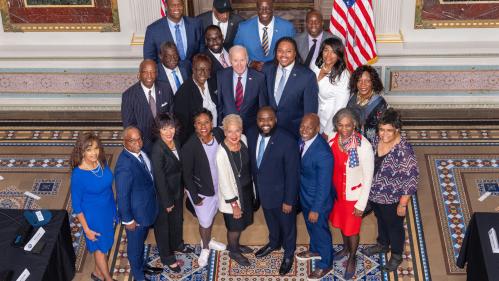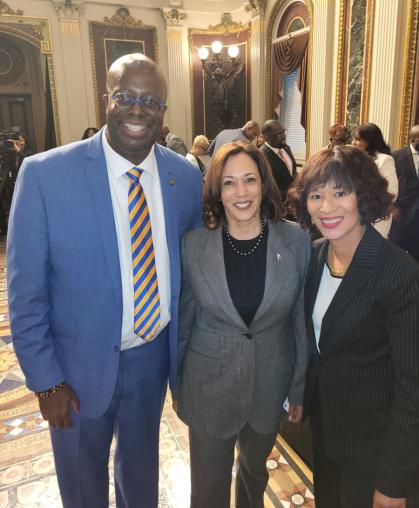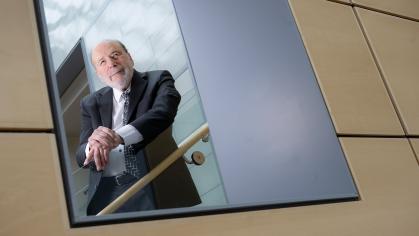Social Work Professor Appointed to President Biden's Commission on Educational Equity

When Marla Blunt-Carter became a member of President Biden’s advisory commission on advancing educational equity, excellence and economic opportunity for Black Americans, she thought about the impact of another social worker who served in the federal government: Frances Perkins, President Franklin Roosevelt’s secretary of labor.
Perkins was the first female cabinet secretary. Her ideas spearheaded some of the most important social welfare programs in history – social security, unemployment compensation, child labor laws and the 40-hour work week.
Dubbed “the woman behind the New Deal,” Perkins has always been an inspiration to Blunt-Carter, an associate professor in the School of Social Work.
“It was because a social worker was in that political role at the table that we all benefit today,” said Blunt-Carter who was recently sworn in as one of the 21 members of the commission by Vice President Kamala Harris.
“The exciting part so many years later is that my experience and my ability to see policy through a social work lens is not new but something that is needed now more than ever,” she said.
The associate professor of professional practice came to Rutgers in 2014 and teaches courses ranging from diversity and oppression and social welfare policy to management, supervision and strategic planning. She has held a variety of communications and public policy jobs in higher education and federal and state government, including working in the Obama White House as senior liaison for professional correspondence in the Office of the President.
She also worked for then Senator Biden as director of constituent services in 2005 and was one of the 538 electors to cast their vote more than a decade later for Biden in the 2020 presidential race.
The Delaware native comes from a family of elected officials. Her sister, U.S. Representative Lisa Blunt-Rochester, the first woman and first African American to represent Delaware in Congress, is now running for the U.S. Senate. Her father, Ted Blunt, who graduated from Rutgers with an MSW in 1968, was on the Wilmington Delaware City Council for 25 years and stressed to his daughters the importance of protecting democracy and being of service to others, Blunt-Carter said.
“I have dedicated my life to addressing social injustices through policy, politics and education,” she said. “To be able to help make substantive change and contribute to work that is important to our nation and our democracy is a dream fulfilled."

At Rutgers, Blunt-Carter said, this means developing courses focused on serving communities, developing leaders and creating social policies to address racial, environmental, economic and political injustice. She is designing a political social work course, she said, that will train social workers to be engaged in political work, civic participation and the electoral process.
As a member of the presidential advisory commission, Blunt-Carter will join educators and nonprofit, community, business and industry leaders, like Chad Dion Lassiter, executive director of the Pennsylvania Human Relations Commission, and the other MSW selected to serve.
Over the next 11 months the commission will examine equitable access to education, how to reduce achievement gaps, steps to promote college readiness and success, career development and economic empowerment, policy recommendations and advocacy and community engagement and empowerment.
“We need to have a better understanding of what people are experiencing and how education equity and economic opportunities are connected,” said Blunt-Carter. “We also need to understand more how we define poverty. Millions of people are working every day and are above the poverty line but are struggling.”
Taking the oath in the Indian Treaty Room at the White House, where the Bretton Woods agreements and UN Charter were signed, made her realize even more the importance of her new role.
“The work we will do will help everyone,” said Blunt-Carter. “Our democracy is designed and works only with the help of citizens to make it better. That’s why when I raised my hand and was sworn in by the vice president my eyes welled up with tears because I knew this work would be impactful and I was honored to do my part.”




